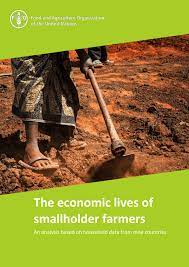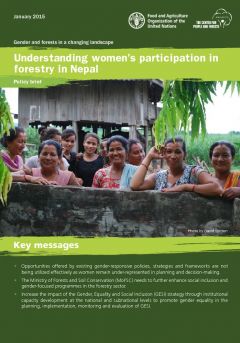Focal point
Location
The Food and Agriculture Organization of the United Nations leads international efforts to defeat hunger. Serving both developed and developing countries, FAO acts as a neutral forum where all nations meet as equals to negotiate agreements and debate policy. FAO is also a source of knowledge and information. We help developing countries and countries in transition modernize and improve agriculture, forestry and fisheries practices and ensure good nutrition for all. Since our founding in 1945, we have focused special attention on developing rural areas, home to 70 percent of the world's poor and hungry people.
Members:
Resources
Displaying 1791 - 1795 of 5074The economic lives of smallholder farmers
About two-thirds of the developing world’s 3 billion rural people live in about 475 million small farm households, working on land plots smaller than 2 hectares. 1 Many are poor and food insecure and have limited access to markets and services. Their choices are constrained, but they farm their land and produce food for a substantial proportion of the world’s population. Besides farming they have multiple economic activities, often in the informal economy, to contribute towards their small incomes.
Safeguarding land tenure rights in the context of agricultural investments: A technical guide for government authorities involved with the promotion, approval and monitoring of agricultural investments
This technical guide elaborates on specific aspects of the Voluntary Guidelines for the responsible Governance of Tenure (VGGT) relating to agricultural investments and provides detailed guidance to government authorities and others on actions they can take to help them to create an enabling environment for responsible and sustainable investments.
Understanding Women's Participation in Forestry in Nepal
This brief discusses how gender perspectives are being integrated in Nepal's forest policies, laws and regulations in terms of women's representation, participation, access and decision-making in forest use and management. The brief also highlights the key challenges that prevail and outlines recommendations to promote gender mainstreaming further in forestry.
Understanding Women's Participation in Forestry in Thailand
This brief discusses how gender perspectives are being integrated in Thailand's forest policies, laws and regulations in terms of women's representation, participation, access and decision-making in forest use and management. The brief also highlights the key challenges that prevail and outlines recommendations to promote gender mainstreaming further in forestry.
Understanding Women's Participation in Forestry in Indonesia
This brief discusses how gender perspectives are being integrated in Indonesia's forest policies, laws and regulations in terms of women's representation, participation, access and decision-making in forest use and management. The brief also highlights the key challenges that prevail and outlines recommendations to promote gender mainstreaming further in forestry.










